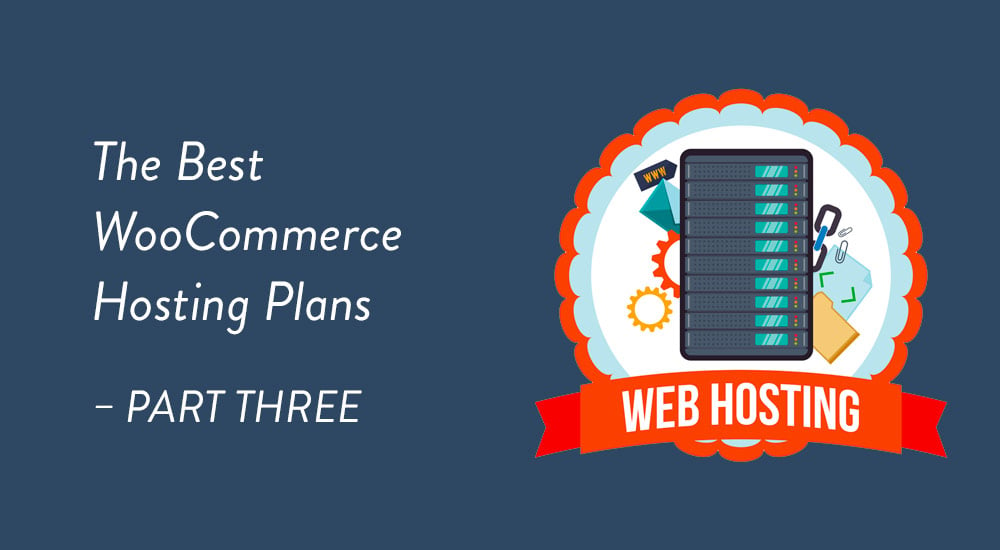In Part 3 of our Best WooCommerce Hosting Plans we take a look at the VPS market and share our recommended VPS for WooCommerce hosting.
Why so long for Part 3?
In the 4 months that have passed since I wrote Part 2 of this guide we’ve been crazy busy here in CommerceGurus HQ. We launched the wildly successful Adrenalin WooCommerce theme at the end of October which took off like a rocket and meant we put our blogging duties were neglected. We’ve also been working on a number of exciting consulting projects and have a few more themes in the pipeline for 2015 so stay tuned for more frequent posts in the near future 🙂
WooCommerce Hosting Still Sucks!
My experiences the past few months helping to support our Adrenalin customers continues to highlight the sad state of affairs that the vast majority of WordPress hosts are not suitable at all for WooCommerce. It’s quite common for WooCommerce to add a second or two to the load time of a vanilla WordPress install with no other themes or plugins installed. The situation gets much worse on your average WordPress install where a user might have 20, 30 or more (shudder) plugins installed and fails to do Plugin Due Diligence. Plugin Due Diligence is the simple process of making sure that the plugin you’re about to install is:
- Reputable – who is this developer? what’s their track record? Do they have a blog? Are they active on social media and on support forums? What do other people say about them?
- Fast – how well is the plugin coded and how much additional load does it add to my site?
- Up to date – when was the plugin last updated? Does it support the latest versions of WordPress and WooCommerce?
Most people don’t conduct serious Plugin Due Diligence and then end up with a slow eCommerce website. You might get away with that with a simple WordPress site as you can always fall back on a caching plugin like W3 Total Cache.
But the big problem with WooCommerce is that a caching plugin won’t hide a lack of Plugin Due Diligence or underpowered hosting (or both). WooCommerce features like dynamic carts on every page with your subtotal/item quantity displayed render caching plugins pretty much useless. Not entirely useless but pretty useless (caching is still ok for users who’ve not added anything to their cart – but they’ll most likely notice a huge slowdown once they add something to their cart which will impact on conversion!). You’ll no longer be able to create static copies of your site because if you did then your users wouldn’t be able to see a dynamic cart. You might get away with this on a simple content focused blog but if you’re serious about selling online, speed is so important.
The search for the perfect WooCommerce host.
All of these factors described expose the fact that most big WordPress hosts were not designed to be optimized for eCommerce. This is a huge problem in our community. Most WooCommerce users are not aware of this. Most assume as WooCommerce is “just another plugin” that their crappy shared host should be fine. That’s not the case. In my view, WooCommerce needs a completely different type of hosting solution – one that is focused on in memory caching like memcached and performance tuned database instances. To date, there’s been very little in the way of WooCommerce specific tuned hosting. Compare this to the Magento community where there’s tons of Magento specific hosting services. Right now the perfect WooCommerce host doesn’t exist – and that’s a damn shame.
So I know you’re probably thinking at that point “Hang on I thought this post was about the best WooCommerce hosts – not a rant about crap ones!” Well it is, it’s just taking me a while to get there 🙂 It’s important to set the context that it is my opinion that this is an underserved market and that the hosts we’re recommending here are damn fine hosting companies but no one has created the perfect WooCommerce hosting platform yet.
I think there’s a huge opportunity for a clever host to dominate this market in 2015.
In the meantime let’s take a look at our VPS recommendations for WooCommerce.
A note about our judging criteria
NOTE: Our shortlist of recommended VPS providers is completely based on personal experience in hosting eCommerce websites over the past 15 years. In that time we’ve developed a pretty good spidey sense for what makes a good host. We’ve seen good hosts come and go. Of course we’ve also spent the time to review the low level numbers provided by hosting industry experts before ever signing up with a host. But the shortlists below are largely based on personal experience as customers of each host.
Best Unmanaged VPS for WooCommerce
TL;DR WARNING: Do NOT select an unmanaged VPS unless you’re comfortable with managing a Linux server via the terminal/command line.
An unmanaged VPS is not for the faint of heart. If you’ve never managed a Linux machine via a terminal session/command line before then I wouldn’t recommend you go down this route if you’re in need of an immediate host for your WooCommerce powered store. That said, if you’re just getting up and running and are keen to learn the dark arts of Linux sysadmin, then by all means proceed down the rabbit hole of an unmanaged VPS. Be prepared for a few months of learning how to do things via a command line, how to setup web servers and mail servers from scratch, how to secure your VPS with your own firewall, how to harden your web server, how to manage backups and rotate log files. The list of tasks goes on and on. If you’re in a time crunch you absolutely don’t need this additional overhead. But if you’re keen to experiment with your own machine – then cool – go for it! You’re also going to have to get used to your hosting company saying “sorry can’t help you!” If you’ve come from the comfort blanket of managed hosting this can be unsettling for a while – especially if it’s in the middle of a crisis and you’re trying to figure out what the hell is going on with your server!
If you’ve already got the sysadmin/devops chops then going the unmanaged VPS route for WooCommerce has some significant benefits. YOU get to build your own highly tuned VPS that you can optimize for first class eCommerce performance. This is THE major significant advantage going the unmanaged route has over the managed VPS route. By going unmanaged you can build out your WooCommerce server to utilize nginx, PHP-FPM (or PHP-HHVM if you’re really brave), memcached and Varnish. Plus you also gain a lot more control over your database instance and can make your own performance optimizations based on what’s right for your site. This can be incredibly valuable (and almost a necessity for high traffic WooCommerce stores) as your store starts to grow. Quite simply, the major advantage of this approach is that it’s possible to tune an unmanaged VPS on a next generation custom LEMP stack and throw a lot more traffic at it than you would get away with on most managed VPS providers – which means you’ll save a lot in monthly hosting costs if you invest in your sysadmin capabilities. It will be up to you as what what makes most sense for your business.
Shortlist of Recommended Unmanaged VPS providers for WooCommerce
Honestly, I wouldn’t hesitate recommending ANY of the 3 hosts below. They all provide top class unmanaged VPS machines. Each has their own strengths and weaknesses.
- To this day, Linode are still the first host I go to when I want a rock solid host for production sites of any kind.
- They are a 6 out of 5 host on basically any criteria you can think of to judge a hosting company.
- In recent years they’ve come under increasing competitive pressure from the likes of Digital Ocean (DO) but they’ve responded brilliantly in kind with new SSD plans and pricing to compete with DO and similar contenders.
- For WooCommerce sites I recommend no less than the Linode 2GB plan ($20/mo.) I would also recommend starting with the Linode 4GB ($40/mo.) if you’re getting any kind of traffic to your online store.
- I also strongly recommend the first thing you do is to enable backups of your Linode (another $5 per month on the 2GB plan). The Linode backup system is worth it’s weight in gold for an eCommerce site and it’s one of the best in the business.
- Digital Ocean appeared out of nowhere a few years ago. A combination of ultra cheap servers ($5/mo), high performance SSD disks, a great API for managing droplets (what DO called their machines) and some super slick marketing meant that DO has quickly gone from the new kid on the block to one of the biggest hosting companies in the world.
- DO droplets are awesome. The DO control panel is incredible for managing Droplets.
- Personally, I still have some concerns with trusting DO for my production sites. The backup system in DO is still not as well developed as I’d like it to be. I’ve also had issues with it’s reliability over the past few years. In one case it took me sending a support ticket for their sysadmin team to realise backups had not run on one of my droplets for a few months. That’s NOT the kind of experience that gives you warm, happy feelings inside when it comes to running an eCommerce site.
- What I do love about DO is it has become my development playground. Low powered machines for $5/mo. is a great way to spin up a new machine for a few weeks to experiment with something new before moving to production.
- I would NOT recommend the $5/mo. droplets for production use with WooCommerce sites. The DO 2GB droplet is the same price as Linode – $20/mo.
- Rackspace is a stalwart of the hosting business. It’s servers are trusted by some of the biggest eCommerce players in the world.
- Rackspace are more expensive. For a 1GB machine you’re looking at about $25 per month. So for the equivalent 2GB minimum we recommended for Linode/DO would be approximately $46.72 per month.
- So why go with Rackspace rather than DO or Linode? If you’re completely comfortable managing your own machines then there’s probably no reason to do so. But if there’s even a chance that you might need some form of managed service in the future then I would recommend Rackspace. Their managed service is the best in the business.
The Winner – Best Unmanaged VPS for WooCommerce
If I had to just choose one unmanaged VPS provider over the others on the shortlist it would have to be Linode. While competition in this segment of the market is heating up, Linode for me are still head and shoulders above the competition – particularly given the importance of a stable, rock solid host for eCommerce.
Best Managed VPS for WooCommerce
There are tons of managed VPS hosting providers out there. Do yourself a favor – avoid at ALL costs the VPS plans offered by the likes of Bluehost, HostGator and GoDaddy. Just don’t do it! A managed VPS will always be more expensive that an unmanaged one given that the hosting plan also includes some form of technical support that you simply won’t have with an unmanaged server. For many WooCommerce users currently on shared hosting plans and with little or no server/system admin skills, you should avoid unmanaged VPS plans and go straight to a managed VPS plan.
Shortlist of Recommended Managed VPS providers for WooCommerce
I’ve used the services of pretty much every host on the list below in the past few years. Again, I’d be happy to recommend pretty much any of these hosts. Again I’m setting a minimum requirement of 2GB RAM and ideally SSD disks. You won’t find a huge amount of variance on the price of each host on this list at that spec as this is an extremely competitive market. All of these hosts will each have their own unique strengths and weaknesses (e.g. Knownhost don’t provide a Live Chat but their email response times are pretty good) Nearly all of them will be offering CentOS machines running Cpanel, Daily backups, Managed Support (with decent experience with WordPress. ), Free Migrations, Root/SSH access. Some will also offer a number of different locations across the globe which can be useful if your audience is concentrated in one particular area. In some cases these providers may also offer an unmanaged plan for approximately $15-$20 cheaper. Again, avoid this unless you’re happy managing your own servers each month.
Perhaps the most WordPress centric of all the providers on this list. Siteground have been lots of waves in the WordPress community the past few years as they get more involved in the community itself, but also for providing servers that are optimized for optimal WordPress performance. I’ve a had a lot of dealings with Siteground the last year and I can safely say know WordPress inside and out. Their servers are also hard to beat.
Recommended Plan: Cloud 1 Plan – 2GB RAM, 40GB SSD, 1TB Bandwidth – €51/mo. (approx $58/mo.)
Knownhost are probably considered to the best managed VPS hosting company in the world right now. Their support is legendary and their servers are rock solid. I’ve run several VPS machines with Knownhost over the years and have never had a single issue with them. Top quality hardware and a support team that really know their stuff.
Recommended Plan: VPS-SSD-2 Plan – 2.25GB RAM, 40GB SSD, 5TB Bandwidth – $50/mo
We’ve already discussed Rackspace earlier on when considering unmanaged VPS providers. Their support team are right up there with Knownhost as one would expect from one of the biggest hosting companies in the world.
Recommended Plan: General1-2 mPlan – 2GB RAM, 40GB SSD, Bandwidth n/a, – $55/mo.
WiredTree/Futurehosting
I’m grouping WiredTree and Futurehosting together purely because while I’ve used both of these providers before, I’ve not spent sufficient time with them to really put them under stress – but they have excellent, long standing reputations in the managed VPS market.
Wiredtree Recommended Plan: Pure SSD VPS – 2GB RAM, 40GB SSD, 4TB Bandwidth – $55/mo.
Future Hosting Recommended Plan: SSD3 Plan – 3GB RAM, 50GB SSD, 3TB Bandwidth – $44.5/mo.
Other notables which come highly rated (but which we’ve not tested)
A Small Orange – Some people swear by A Small Orange but I can’t ignore their recent acquisition by EIG which has been the death knell for many a good host over the years.
EuroVPS – Based in Amsterdam which can suit European based sites/stores more so than many of the other VPS providers who don’t have European data centres.
Liquidweb – Rock solid but a good bit more expensive.
The Winner – Best Managed VPS for WooCommerce
I’m really torn on picking a winner for the best Managed VPS for WooCommerce. If you had asked me this question 12 or even 6 months ago my answer would have been unequivocal – Knownhost. Knownhost for me are head and shoulders above the competition in terms of consistently superior customer service and rock solid, high performance machines. I continue to be a customer of Knownhost to this day and I’ve NEVER had a single fault on their machines. But and this is where my earlier rant comes full circle folks, Knownhost suffer from the same impediment as nearly every other managed VPS provider on the shortlist. They don’t as of yet provide a VPS platform that’s been optimized for WordPress and WooCommerce. In fact, NONE of my shortlist do as of yet offer machines that have been optimized for high volume eCommerce/WooCommerce stores. But one does come close. Damn close. And for this reason I’m going to make them the outright winner in this category – Siteground. Remember folks there’s very little to choose amongst all of the managed VPS providers on my shortlist. But Siteground do offer one major differentiator that the others do not. The Siteground Supercacher. The Supercacher is actually a series of different caching mechanisms that you typically won’t find on any shared or managed VPS provider. Normally you’d have to go down the unmanaged DIY VPS route to avail of these. Which is why it’s so interesting and promising to see a managed VPS host introduce these technologies to the masses via an easy to web user interface. In a nutshell you get all the good stuff like Varnish and memcached without the significant sysadmin overhead. And it all works swimmingly well. Siteground have also tuned their servers to be optimized for WordPress and performance in general which makes a huge difference with some managed VPS providers who are essentially just giving you untuned stock cPanel/WHM instances. On top of that here are some other major differentiators that are normally reserved for Managed WordPress hosts (which we’ll be looking at in Part 4!).
- Git repo
- Free CDN
- WordPress Staging Environment (worth it’s weight in gold – you can test all your new plugins/themes/code changes in the safety of a sandboxed staging environment before going live).
- Automatic WordPress version updates
I’ve been using Siteground for over 12 months at this stage and I’m mightily impressed by what they’ve been able to achieve to differentiate themselves in this hyper competitive market. Their support is pretty good too. I don’t think they’re quite as good as Knownhost from that perspective but they do have a live chat support service that Knownhost don’t offer. Siteground for me are an example to all other VPS providers as to what they need to be doing to compete and differentiate in 2015. I’m hopeful that others will follow shortly and I hope to see someone really go to town and produce a compelling managed VPS plan optimized specifically for WooCommerce in 2015.







 Common WooCommerce mistakes
Common WooCommerce mistakes From Visits to Journeys: How to Drive Visitors Back to Your Store
From Visits to Journeys: How to Drive Visitors Back to Your Store Starter Child Theme for Captiva released
Starter Child Theme for Captiva released Facebook to shake up eCommerce
Facebook to shake up eCommerce
I’ve been waiting for your part 3 like forever. Thank God you’ve finally released it. Siteground sounds like a great choice.
I’m just starting out on ecommerce and chose Woocommerce for its low-entry requirements. But the hosting is killing me. Tried HostGator, GoDaddy, and now looking for something solid. You’ve helped me tremendously by doing the research. I would not have the expertise to evaluate so many hosting companies let along figure out which is a better option. Great job on getting this task done!
Thanks for the kind words Janice 🙂 You won’t go wrong with Siteground.
Hi Colm, thanks for this great overview. Very helpful!
I am currently moving my site from Cart66 on WPEngine to Siteground with Woocommerce. The site is not launched yet but there were things that bothered me about Cart66 for my membership sites with many music download files expected.
Will the Siteground GoGeek plan be a good place to launch my commerce site from or would I need to go with a different plan to start? Thanks again!
Hi there Tobo,
The GoGeek plan should be fine for smaller eCommerce sites. I would caution though that if you have a lot of music files being downloaded you should check with SiteGround first re: excessive bandwidth usage – better to know that now rather than later 🙂
Colm
Super helpful.
Thanks.
Great review, thank you. I have had multiple hosting issues in the last week and have been digging deep to understand it all. Glad I read your review towards the end of this learning as I wouldn’t have really understood it at the beginning! I also came to the conclusion that Siteground was going to offer me the best solution. We are looking at the Cloud hosting Business Plan. Does that offer a staging site? You mentioned this option but I couldn’t see it offered anywhere. Thanks again. Ruth
Hey Ruth,
Glad we could help you 🙂 I’m 99% sure the Cloud Business Plan does include the WP staging environment – their sales team will confirm this though 🙂
Best,
Colm
Hi Colm, I did the research and took your advice and moved to Siteground earlier this week. I just added up the amount if time I have spent contacting support with them – over 20 hours. They are an absolute disaster. Installed on the wrong servers. Gave me the wrong dedicated IP address, gave me wrong cPanel login details, told me they couldn’t install SSL and then after much kicking and screaming decided they could. The last straw has come with moving email over. Gave me incorrect settings which have taken 2 days to resolve. They think they have great customer service and if you count being easily accessible then yes, they have good support but if good support is about looking at the account, listening to your customers and resolving issues then, no sadly they are totally useless. Let it also be known that they are in Bulgaria. Which is absolutely fine but somehow I thought I was using a US company as my site needs to be based solely in the US. I’m sure others have had great results with them but in this case it has been nothing put pain that has cost me upwards of $20,000 in lost revenue.
Hi,
Sorry to hear about your bad experiences with Siteground. It certainly doesn’t match up with my own personal experiences – nor have I heard many others have this kind of experience. That plain sucks! We certainly keep a close eye out for any potential drop in customer service and the competence of hosts we recommend and are very grateful for you taking the time to tell us about your experiences. Re: Siteground location – yes we’re fully aware that they are based in Europe (so are we!) but to my knowledge their servers are located in the US
see here http://kb.siteground.com/where_are_sitegrounds_servers/
I know they also have servers in Europe and the Far East for customers who require specific locales.
Re: lost revenue – I would always always recommend taking a cautious approach moving from one hosting provide to another – never leave yourself in a situation where you can lose revenue like that. Only fully migrate from your live servers once you’ve conducted a full trial migration and test period with your new host to ensure that they are up to scratch on what you need.
Hope you find better luck with your next host.
Colm
Here is the catch – while SiteGround has easily accessible Tier 1 support, if you have to speak with Tier 2, you are out of luck. They can only be reached via their ticketing system, and you are at their mercy when they get back to you. Having an interactive discussion with someone who actually understands everything and is knowledgeable enough to be truly helpful is not allowed (at least at the “Geek” level for $15/mo). You can not even get a supervisor on the phone.
I tried to move my site from GoDaddy. They did the copy, but we ran into issues with SSL. I had wanted to test everything before we go live. None of the SSL can be enabled until the DNS A record is moved to point to SiteGround. Catch 22.
If they can’t understand the need to get a Tier 2 person on the phone, then they can never truly become a world class hosting company.
Hey Lou,
Thanks for the comment.
Do you expect access to Tier 2 support via phone for $15/mo?
I’d probably consider Rackspace to offer the best customer service of any hosting company in terms of easy access to very skilled engineers – but this comes at a price – add at least one 0 on the end of the Siteground price – and possible 2 00’s 🙂
People cost money and your hosting charges ramp up accordingly when you need access to experts.
With an SSL move – you can’t simulate an SSL move unless you use an unsigned cert on the new host before you repoint your DNS – so I don’t think that’s unique to Siteground – you’ll have the same issue on any host.
Colm
Thanks for this great series. I also think there is huge untapped market for a true turnkey (ahh, buzzwords) hosting solution for Woocommerce. I love Woocommerce because of it’s customizability but it’s a pain trying to get the site to load as fast as hosted solutions like Shopify or Bigcommerce which cost less per month than a Cloud VPS server, and with less configuration.
What about Kinsta? I have had a couple of recommends. They run on Linode servers with some sort of special arrangement for Wordpress with WooCommerce.
Hey Tom,
I’ve had one customer migrate a very busy site over to Kinsta the past few weeks with great results.
There’s no special arrangement WooCommerce 🙂
They just have a really awesome stack powered by HHVM which supercharges php load times. It’s not without it’s issues but so far they’re proving to be real top contenders in the managed WordPress space. I really hope they can maintain this as they scale and grow.
Colm
What issue have you experienced with Kinsta? Quote from Kinsta “WooCommerce is fully supported in our environment, we have special rules for caching WooCommerce sites.”
Re: Kinsta issues – Kinsta have gone all in on HHVM – which is great 95% of the time – until you are running an old plugin/code that isn’t HHVM compatible. It’s rare that this happens and is getting rarer – but it does still happen and it really impacted our client.
Re: WooCommerce statement – the “special rules” are just good caching rules you would expect any good managed WP host to have in place for popular WordPress plugins like WooCommerce. Again some other managed WP hosts DON’T do this or don’t do it v. well so it’s great Kinsta have configured them – but it’s nothing a decent sys admin can’t do themselves if they know what their doing. i.e. Kinsta have no properietary knowledge that Woo have shared with them – it’s just good systems optimization 🙂
Some friendly feedback. I just came across this article. Sure would be nice if you had links to the first two.
I have encouraged clients to use Irish based hosts as their customers are here (generally Blacknight and R365). Did your tests include a distance-to-customer criteria?
Hi Damien,
I’ve plenty of experience with basically every Irish based host and I no longer recommend any of them. I’ve been on the end of major hard drive failures for no less than 3 of them. Any benefits from lower latency are far outweighted by my concern for the quality of their offering and inferior customer service – and that’s based on actual experience with large enterprise customers – not hear say. I’d love nothing more than to plug an irish based host but none of them are up to it in my experience.
Colm
Just to follow up on Kinsta…They retired the entry level plan and reduced the resources on all the other plans. The prices also increased. They did this in the middle of me emailing them about the plans and choices. They never mentioned it the change. I had the entry level in my checkout and checked out already but they would not honor it and cancelled my account because I would not upgrade to the more expensive plan with less resources. They said it was a change from their datacenter (linode) and nothing they could do to change it. They also sold me a server location that turned out to be unavailable. Not very connected. Support is slow from what I saw.
If you can manage your own server Linode offers good hardware, but not Woo specific. I ended up with a managed VPS and I would advise anyone on shared hosting to switch.
That sucks Tom :/
The challenge with managed WordPress hosting is that unless you’re very well funded or in a fortunate financial position it’s a difficult business to scale I think. I think we’ll see lots of similar price rises from the smaller bootstrapped managed WordPress hosting companies.
But all that said it would be good customer service if they had have honoured our original checkout session.
Colm
Such a great overview, your insights are really very helpful. I personally prefer BlueHost and Hostgator for this.
Thank for your post. I found that SiteGround might be a good choice. But do you have any experience with Dreamhost Managed Wordpress or websynthesis.com service?
I do NOT recommend Dreamhost.
Great information – Thank you.
We have found that Rackspace has an issue in processing emails from WooCommerce. They do not accept the method by which Woo sends out emails and customization are needed to get this to work properly. I’m not 100% certain but I believe sites using Rackspace must use a plugin to send emails via SMTP and not the Wordpress email function.
Hey 🙂
The issue is not WordPress just limited to WordPress – see here
http://www.joshuawinn.com/huge-email-delays-on-rackspace-cloud-sites-dont-use-php-mail/
http://stackoverflow.com/questions/9664218/php-mail-not-working-on-rackspace-cloud
Pretty common on a lot of larger hosts nowadays – I always recommend routing mail through something like Mailgun for better deliverability anyway 🙂
Colm
I’m curious what you think of using DO and ServerPilot? I have heard that it can be great solution that allows you to have full control of your server but is managed as well.
I’m currently on DreamPress and I’m having all kinds of issues so looking to move. I keep hearing about WPEngine but you didn’t mention it here. The other option I keep hearing about is DO w/ ServerPilot. My biggest issues are slow load times, “internal server errors, try again” randomly popping up etc. All DreamPress tells me is “you have too many plugins, delete your plugins”.
By the way, I have to laugh at the comment “I do NOT recommend Dreamhost”. I read that and thought, that’s how I feel! They sound great but good luck.
Hi, Colm
Great post! I am thinking of immigrating my current website to a reliable hosting, I choose woocommerce and will have more than 1k products. After searched many posts online include yours, my consideration narrow down to siteground(cloud-1) and linode. I have experiences with siteground(shared hosting) and hosted two small e-commerce sites there, the website speed is fine, although still lower than my expectation(Because I am a SEO, I am crazy about speed.) . So my concern is can siteground(cloud-1) handle 1k products? And how about gogeek plan? Budget is a little tight.
Hi,
Thank you for sharing great information. I would like to switch to managed VPS hosting as well. Do you still recommend KnownHost in 2017?
Yes definitely 🙂
Great article. I haven’t read all the comments so maybe this was mentioned, but I think https://rocket.net is the best WordPress/WooCommerce Managed Host in existence. The benefits are too many to list, but I suggest people check them out. They will take your existing site and move it to a temporary domain for free and prove to you through tools from keycdn.com that it loads faster. Every host claims to be the fastest, but the numbers don’t lie, they actually are.